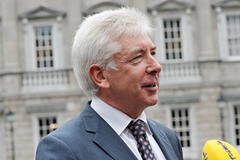Primary Care in Ireland: Turning a Vision into Reality
Ireland needs to make radical choices to improve its health and well-being with society taking responsibility and government providing free GP cover and tackling the key challenges of tobacco and alcohol.
This Government’s vision for primary healthcare in Ireland is the development of a single-tier healthcare system where access is based on medical need and not on ability to pay.
Primary care focuses on keeping people healthy and preventing illness rather than simply curing sickness after it has developed. Ideally, primary care is situated locally, in the community or even in the homes of the patient and away from a hospital setting.
Ireland is at a crossroads when it comes to health policy. There are many challenges facing our health system. These include but are not limited to constrained financial resources, a population over 65 years of age that will more than double over the next 30 years, and a baby boom. Chronic diseases and disabilities related to poor diet, smoking, alcohol misuse and physical inactivity are also on the rise.
It’s evident that we’re going to need to get more out of our health system for less. If our health system feels over-burdened now, this will only get worse unless radical strategic health choices and investment are made now.
To make our Health Service efficient, effective and fair requires not only considerable financial investment but also a major shift in focus from hospital-based care to primary care. The current budgetary constraints must not deter innovation in our health system. The policy decisions we make now will determine the health and well-being of our society for many decades to come.
Better GP care
The Budget announcement to extend GP access to children aged five and under is a hugely significant move. It is now being brought forward in the form of legislation. But it’s just the beginning. It is only the first step in the implementation of a policy of universal primary care.
Too many people in Ireland avoid going to their GP for essential medical care as they simply cannot afford the €50-60 fee. This ends up costing the Health Service more, as the monitoring and treatment of preventable diseases is delayed. As a result, late secondary care ensues. If the barrier of GP fees is removed, people are far more likely to address a medical issue at its earliest stage – when it’s easiest to solve. The earlier the diagnosis and intervention, the better the outcome and the cheaper the treatment.
There’s a reason GP care without fees is a norm in Northern Ireland, Great Britain and across Europe – because it makes sense and it works.
But long-lasting health reform requires even more than restructuring our health services to a primary care focus. If we keep going along the current path, it is estimated that most OECD countries will spend more than 20 per cent of GDP on health care by 2050. A real challenge is how we as a society can work together to find ways to encourage individuals to take more responsibility for the management of their own health.
Public health
This Government has been making a concerted effort to empower people to take control and responsibility for their well-being. ‘Healthy Ireland’ is the government framework for action, launched earlier this year, to improve the health and well-being of people living in this country over the coming generation.
Actions under way include a national plan for physical activity and the launch of a communications campaign to address childhood obesity. Parents are being urged to make practical changes to everyday lifestyle habits – such as portion sizes, drinks and screen time – to make a difference to the health and well-being of children and combat Ireland’s high levels of childhood overweight and obesity.
‘Tobacco Free Ireland by 2025’ is the new tobacco policy which was launched last month by Minister Reilly. The policy has many recommendations with the overall aim of de-normalising smoking in Irish society.
Alcohol
I was very pleased to bring to Cabinet a package of measures to address the serious over-consumption of alcohol in this country. To implement these measures, the Government approved the drafting of the first piece of public health legislation to address the problem of alcohol misuse: the Public Health (Alcohol) Bill.
Ireland’s drinking patterns are complicated and there’s no single silver bullet policy that will resolve over consumption of alcohol overnight. That’s why I proposed to government a wide-ranging package of measures to reduce alcohol consumption, including the introduction of minimum unit pricing, the separation of the sale of alcohol from other products, reformed health labelling of alcohol products and the regulation of marketing and advertising of alcohol, including sports sponsorship.
There’s a lot more work to be done in realising our vision of a health system in Ireland grounded in universal primary care, where citizens take an informed and pro-active interest in their health and well-being.
I’m heartened that the first steps are being taken in this regard. I look forward to children aged five and under being the first to enjoy the benefits of free primary care access. This is the first but crucial step in creating a sustainable health system fit for the increasingly complex needs of twenty-first century Ireland.
Alex White is Labour Party TD for Dublin South and Minister of State at the Department of Health with responsibility for Primary Care.
This article first appeared in Eolas Magazine: eolasmagazine.ie


Leave a Comment